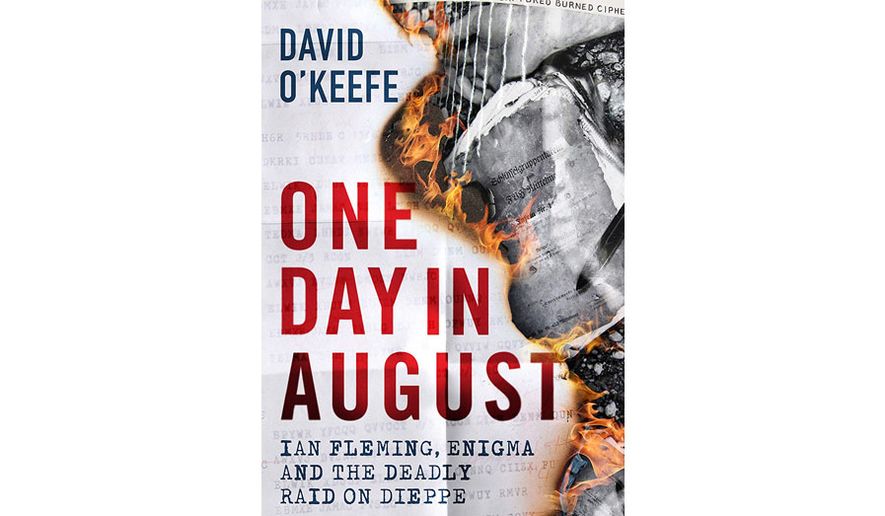OPINION:
Some years ago, I came across an account of the disastrous World War II raid on Dieppe written by a British naval intelligence officer who viewed the raid from the deck of a warship off the coast of France.
The intelligence report read like a thriller, which should come as no surprise, as the naval intelligence officer was Royal Navy Lt. Commander Ian Fleming, who went on to write the James Bond thrillers.
The Dieppe Raid was the stuff of thrillers, and Canadian historian David O’Keefe has written a fine book about the failed operation called “One Day in August: Ian Fleming, Enigma and the Deadly Raid on Dieppe.”
I reached out to David O’Keefe and I asked him why the Dieppe Raid was controversial, tragic and something of a mystery.
“In less than 9 hours on August 19th, 1942, over 1,000 Allied soldiers, sailors and airmen died in a raid on the German-held port of Dieppe, France in the English Channel,” Mr. O’Keefe said. “The vast majority of these deaths, 907, were taken by the Canadians, but the British and the Americans (fighting their first actions against Hitler in Europe) also paid a heavy toll. Right from the start, the excuses given for the inception and the intent behind the raid did not seem to fully explain what the Allies were attempting to do on that one day in August.”
Mr. O’Keefe went on to explain that newly released secret documents established that the raid was planned and launched primarily to solve the cryptographic blackout experience by both British and American Codebreakers when the Germans introduced a new version of their Naval Enigma machine for enciphering their Top-Secret communications.
“This blackout led to the inability to find U-Boats in the Atlantic, which in turn led to the dramatic sinking of American and British merchant shipping, mostly off the eastern seaboard, throughout 1942,” Mr. O’Keefe said. “Like the veins that bring life-giving blood throughout the body, controlling the sea-lanes between America and Great Britain was the center of gravity for the entire Allied war effort. Captured material used to “cheat” the system and speed up the process of cryptanalysis was desperately needed by legendary codebreakers like Alan Turing (of “Imitation Game” fame) who worked at Bletchley Park, the Ultra-Secret codebreaking center.
He said that previously he thought these operations were “ad hoc” rather than a coordinated and developing policy with sanction at the highest government levels in both the U.K. and the U.S.
“This gave me the confidence to come forward and say this is what Dieppe was about.”
I asked what role Ian Fleming played in the raid and Mr. O’Keefe replied, “Lt. Commander Ian Fleming worked for the Royal Navy’s Directorate of Naval Intelligence during the war before becoming famous for his James Bond novels. Fleming was the assistant to the Director of Naval Intelligence Admiral John Godfrey and worked as his “ideas man,” his “hitter” his “go-to guy” with his finger in every pie in the Allied intelligence world,” Mr. O’Keefe said.
“As established for the first time in the book, Fleming worked as an integral liaison officer linking the Naval Intelligence Division with MI5, MI6, the Joint Intelligence Committee, Ministry of Economic Warfare, Political Warfare Executive, Strategic Operations Executive, and Bletchley Park in England. He also was responsible for liaison with the FBI, the OSS (forerunner to the CIA) and the Office of Naval Intelligence in the United States.
“At the core of that multi-faceted portfolio was his responsibility for developing “pinch” policy or doctrine to aid the codebreakers at Bletchley Park and, in turn, to ‘sell’ that approach to the Americans once they entered the war.”
Mr. O’Keefe noted that prior to the Dieppe Raid, Fleming created a special Intelligence Assault Unit to capture the desired material. He stood offshore, prepared to act as the “anchor-man” in the relay race to extract any material pinched from the harbor in the French port.
I asked Mr. O’Keefe if the veterans he interviewed thought the raid was worth it.
“In part, as no amount of research, truth and understanding will ever take the sting of truth out of the Dieppe Raid,” Mr. O’Keefe replied. “One thousand men died in one morning in a raid that failed to achieve its primary objective – although the raiders got so close. However, for some veterans/survivors who had spent their lives trying to figure out what was at the heart of their horrific experience in 1942, just knowing the truth behind the raid gave them a sort of cathartic release.
“As one veteran, Ron Beal, told me, “It doesn’t matter that we did not reach our objective. I know there was a genuine purpose for this raid. I now know why my friends died, and so, I can die in peace.”
“One Day in August” is a well-written and well-researched book about the Dieppe Raid.
• Paul Davis’ On Crime column covers true crime, crime fiction and thrillers.
• • •
ONE DAY IN AUGUST: IAN FLEMING, ENIGMA AND THE DEADLY RAID ON DIEPPE
By David O’Keefe
Icon Books, $39.95, 496 pages




Please read our comment policy before commenting.